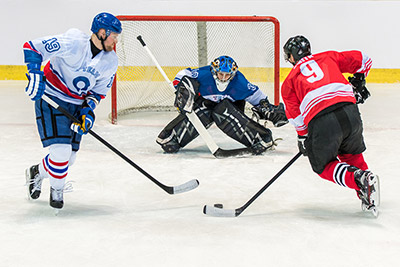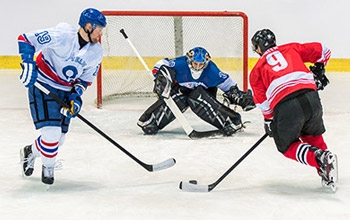
Hockey is considered by many as the undisputed king of winter sports. The combination of breathtaking speed, explosive power, and graceful athleticism make for a thrilling spectacle on ice. However, collisions and other accidents do occur during play that can take you out of the game if you aren’t careful.
Here are some common knee and hip hockey injuries and how to avoid them:
Knee injuries: The most frequent knee injury in hockey is the medial collateral ligament (MCL) tear. The ligament runs along the inside of the knee and is constantly stressed as the skating motion requires the player to push off on the inside of the skating blade. Collision with another player causing pressure on the outside of the knee can also damage the MCL. Other knee injuries include fractures of the kneecap from falling directly onto the knee and ACL and meniscus injuries due to sudden twisting motions. An injury to any of the structures within the knee can cause significant imbalances within the joint resulting in worsening knee pain and disability.
Hip Injuries: Hockey goalies are at a high risk of hip injuries due the low squatting stance adopted when defending the goal and often dropping into the “butterfly” position with the feet flared outwards. The significant stresses on the hip with such movements can result in hip labral tears, groin pulls, hip impingement, and hip flexor injuries.
Using proper equipment including padding and braces as well as learning the right techniques to play the game will ensure that most lumps and bumps experienced will be minor and will heal quickly with rest, ice, compression, and elevation of the injured area. However, it is important to proactively maintain the integrity of your hip and knee joints by performing regular sport-specific stretching and strengthening exercises for your lower body.
If your knee or hip pain persists or seems to be getting worse despite conservative treatment, it is best to be evaluated by an orthopedic specialist.
Dr. Frisch is a specialist orthopedic surgeon focusing on minimally invasive hip and knee joint replacement as well as regenerative treatments for enhanced healing. He believes in creating a very personalized experience with the highest level of service. For all appointments & inquiries, please contact our offices located in Rochester and River District, MI.







